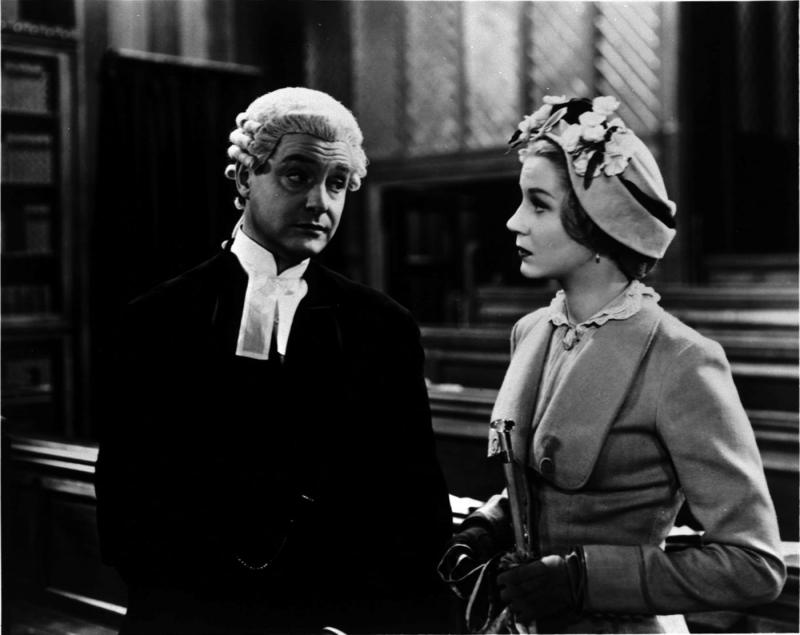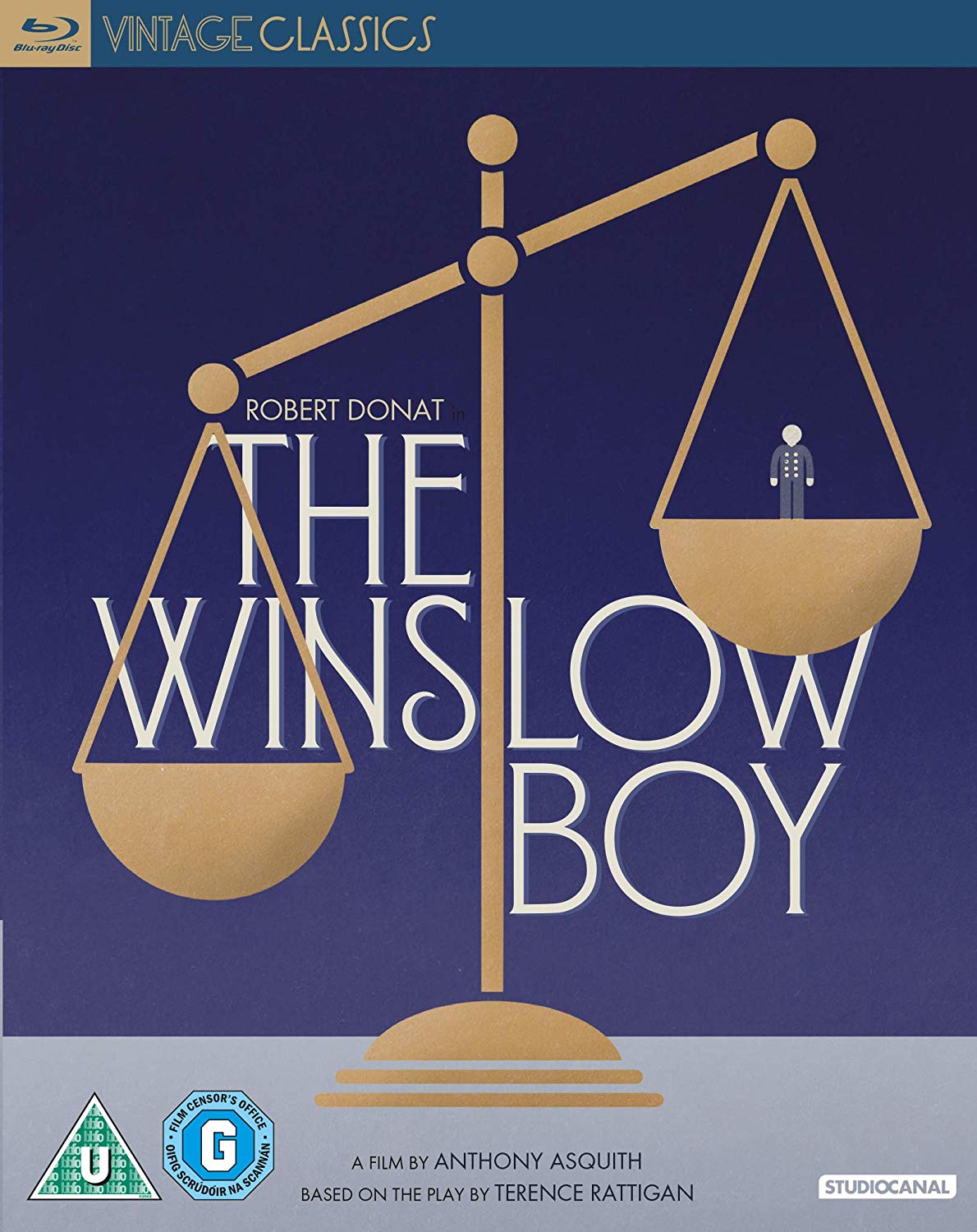DVD/Blu-ray: The Winslow Boy | reviews, news & interviews
DVD/Blu-ray: The Winslow Boy
DVD/Blu-ray: The Winslow Boy
Outstanding Rattigan adaptation, superbly cast and directed

Though set in a handsomely-realised 1912, many of The Winslow Boy’s period details seem disconcertingly contemporary, from aggressive tabloid journalists doorstepping an unfortunate family to boorish behaviour in the Commons. There’s a very funny rant early on from patriarch Arthur Winslow (Cedric Hardwicke), complaining about his elder son Dickie’s insufferable musical tastes, in this case 78rpm records played on a huge wind-up gramophone.
Director Anthony Asquith secures excellent performances from a large supporting cast, Margaret Leighton’s increasingly feisty suffragette daughter Catherine especially sympathetic. Arthur’s early attempts to clear Ronnie’s name get nowhere; the guilty verdict was made by the Admiralty, meaning that it can’t be questioned (“The King can do no wrong”). Scenery-chewing assistance comes in the shape of Robert Donat’s Sir Robert Morton, a maverick barrister who becomes convinced of Ronnie’s innocence after subjecting him to a gruelling cross-examination. It’s a terrifying moment and the film’s highlight. And as we’re convinced that Morton is on the point of abandoning the case, he reveals that “the boy is plainly innocent – I accept the brief.”
 The eventual outcome is predictable, though what we don’t anticipate is the effect that the whole affair has on the protagonists. Arthur’s arthritis soon confines him to a wheelchair, and Catherine’s engagement collapses. Dickie drops out of Oxford when the family can no longer afford to support him. Donat’s Sir Robert also takes a hit, his desire to “let right be done” taking a physical and emotional toll; in the film’s closing scenes we see him pale and drained. The courtroom sequences are gripping, Francis Loftus Sullivan’s menacing Attorney General a superb foil for Donat. The ending doesn’t feel triumphant; we’re left seething at the blatant injustice, at how difficult it can be to right obvious wrongs.
The eventual outcome is predictable, though what we don’t anticipate is the effect that the whole affair has on the protagonists. Arthur’s arthritis soon confines him to a wheelchair, and Catherine’s engagement collapses. Dickie drops out of Oxford when the family can no longer afford to support him. Donat’s Sir Robert also takes a hit, his desire to “let right be done” taking a physical and emotional toll; in the film’s closing scenes we see him pale and drained. The courtroom sequences are gripping, Francis Loftus Sullivan’s menacing Attorney General a superb foil for Donat. The ending doesn’t feel triumphant; we’re left seething at the blatant injustice, at how difficult it can be to right obvious wrongs.
Studio Canal’s restoration is clean and sharp, William Alwyn’s attractive score sounding sumptuous. The extras are fascinating, including the head archivist at the Post Office Museum outlining details of the 1908 case which inspired Rattigan’s play. Geoffrey Wansell discusses the differences between film and play, and there’s an illuminating interview with cultural historian Matthew Sweet, outlining exactly why The Winslow Boy had such an impact after World War Two.
rating
Share this article
The future of Arts Journalism
You can stop theartsdesk.com closing!
We urgently need financing to survive. Our fundraising drive has thus far raised £49,000 but we need to reach £100,000 or we will be forced to close. Please contribute here: https://gofund.me/c3f6033d
And if you can forward this information to anyone who might assist, we’d be grateful.

Subscribe to theartsdesk.com
Thank you for continuing to read our work on theartsdesk.com. For unlimited access to every article in its entirety, including our archive of more than 15,000 pieces, we're asking for £5 per month or £40 per year. We feel it's a very good deal, and hope you do too.
To take a subscription now simply click here.
And if you're looking for that extra gift for a friend or family member, why not treat them to a theartsdesk.com gift subscription?
more Film
 Can I get a Witness? review - time to die before you get old
Ann Marie Fleming directs Sandra Oh in dystopian fantasy that fails to ignite
Can I get a Witness? review - time to die before you get old
Ann Marie Fleming directs Sandra Oh in dystopian fantasy that fails to ignite
 Happyend review - the kids are never alright
In this futuristic blackboard jungle everything is a bit too manicured
Happyend review - the kids are never alright
In this futuristic blackboard jungle everything is a bit too manicured
 Robert Redford (1936-2025)
The star was more admired within the screen trade than by the critics
Robert Redford (1936-2025)
The star was more admired within the screen trade than by the critics
 Blu-ray: The Sons of Great Bear
DEFA's first 'Red Western': a revisionist take on colonial expansion
Blu-ray: The Sons of Great Bear
DEFA's first 'Red Western': a revisionist take on colonial expansion
 Spinal Tap II: The End Continues review - comedy rock band fails to revive past glories
Belated satirical sequel runs out of gas
Spinal Tap II: The End Continues review - comedy rock band fails to revive past glories
Belated satirical sequel runs out of gas
 Downton Abbey: The Grand Finale review - an attemptedly elegiac final chapter haunted by its past
Noel Coward is a welcome visitor to the insular world of the hit series
Downton Abbey: The Grand Finale review - an attemptedly elegiac final chapter haunted by its past
Noel Coward is a welcome visitor to the insular world of the hit series
 Islands review - sunshine noir serves an ace
Sam Riley is the holiday resort tennis pro in over his head
Islands review - sunshine noir serves an ace
Sam Riley is the holiday resort tennis pro in over his head
 theartsdesk Q&A: actor Sam Riley on playing a washed-up loner in the thriller 'Islands'
The actor discusses his love of self-destructive characters and the problem with fame
theartsdesk Q&A: actor Sam Riley on playing a washed-up loner in the thriller 'Islands'
The actor discusses his love of self-destructive characters and the problem with fame
 Honey Don’t! review - film noir in the bright sun
A Coen brother with a blood-simple gumshoe caper
Honey Don’t! review - film noir in the bright sun
A Coen brother with a blood-simple gumshoe caper
 The Courageous review - Ophélia Kolb excels as a single mother on the edge
Jasmin Gordon's directorial debut features strong performances but leaves too much unexplained
The Courageous review - Ophélia Kolb excels as a single mother on the edge
Jasmin Gordon's directorial debut features strong performances but leaves too much unexplained
 Blu-ray: The Graduate
Post #MeToo, can Mike Nichols' second feature still lay claim to Classic Film status?
Blu-ray: The Graduate
Post #MeToo, can Mike Nichols' second feature still lay claim to Classic Film status?

Add comment